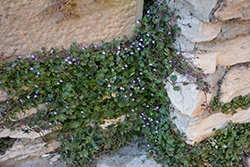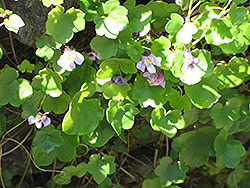It's all about ...
plants

Plant Height: 2 inches
Flower Height: 3 inches
Spread: 18 inches
Sunlight:
![]()
![]()
Hardiness Zone: 6b
Other Names: Ivy-Leaved Toadflax, Climbing Sailor
Description:
A wonderful little filler plant for growing in between flagstones; little scalloped leaves form a low mat; studded with tiny lilac blue flowers all summer long; great for groundcover, edging or draped over terraces or rockeries
Ornamental Features
Kenilworth Ivy is bathed in stunning lavender pea-like flowers with white overtones, yellow eyes and purple centers along the stems from early to mid summer. Its crinkled round leaves emerge light green in spring, turning green in colour. The foliage often turns yellow in fall.
Landscape Attributes
Kenilworth Ivy is an herbaceous perennial with a ground-hugging habit of growth. Its relatively fine texture sets it apart from other garden plants with less refined foliage.
This is a relatively low maintenance plant, and is best cleaned up in early spring before it resumes active growth for the season. It has no significant negative characteristics.
Kenilworth Ivy is recommended for the following landscape applications;
- Mass Planting
- Rock/Alpine Gardens
- Border Edging
- General Garden Use
- Container Planting
Planting & Growing
Kenilworth Ivy will grow to be only 2 inches tall at maturity extending to 3 inches tall with the flowers, with a spread of 18 inches. Its foliage tends to remain low and dense right to the ground. It grows at a fast rate, and under ideal conditions can be expected to live for approximately 4 years. As an herbaceous perennial, this plant will usually die back to the crown each winter, and will regrow from the base each spring. Be careful not to disturb the crown in late winter when it may not be readily seen!
This plant does best in full sun to partial shade. It does best in average to evenly moist conditions, but will not tolerate standing water. It is not particular as to soil type or pH. It is somewhat tolerant of urban pollution. This species is not originally from North America. It can be propagated by division.
Kenilworth Ivy is a fine choice for the garden, but it is also a good selection for planting in outdoor pots and containers. Because of its spreading habit of growth, it is ideally suited for use as a 'spiller' in the 'spiller-thriller-filler' container combination; plant it near the edges where it can spill gracefully over the pot. Note that when growing plants in outdoor containers and baskets, they may require more frequent waterings than they would in the yard or garden. Be aware that in our climate, most plants cannot be expected to survive the winter if left in containers outdoors, and this plant is no exception. Contact our experts for more information on how to protect it over the winter months.
This plant is not reliably hardy in our region, and certain restrictions may apply; contact the store for more information.

